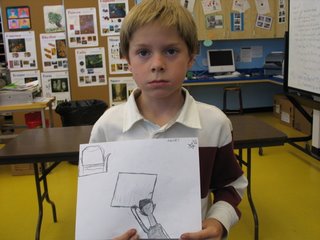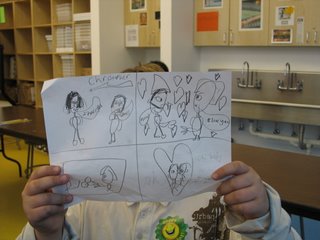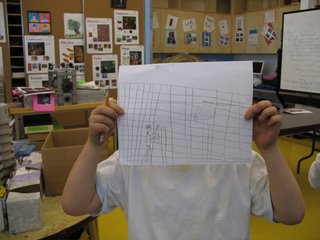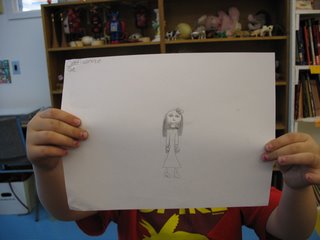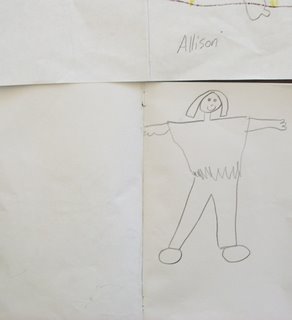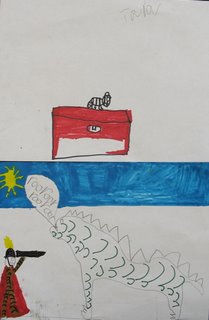Tuesday, November 28, 2006
Thursday, November 16, 2006
Wednesday, November 15, 2006
2. Name Art
Guiding Questions:
• What does it mean to stylize something?
• What is a design?
• What is the advantage of using patterns in a design?
• Do you prefer simple or complex designs?
Objectives/Goals:
• Learn to make bubble or block letters
• Review pattern
• Think about how designs enliven our world
• Present one’s name in a clear and interesting manner
Activities:
• • Use one’s name as the basis for a picture
• Use color, pattern, line in interesting ways
Vocabulary:
Stylize- to give something a distinctive, often artificial artistic style
Design- to work out or create the form or structure of something; to plan and make something in a skillful or artistic way; a pattern or shape, sometimes repeated, used for decoration
Pattern- a repeated decorative design
Simple- lack of complexity, complication, embellishment, or difficulty
Complex- made up of many interrelated parts; a whole composed of various interrelated parts
Definitions provided by:
Encarta® World English Dictionary © 1999 Microsoft Corporation. All rights reserved. Developed for Microsoft by Bloomsbury Publishing Plc.
Guiding Questions:
• What does it mean to stylize something?
• What is a design?
• What is the advantage of using patterns in a design?
• Do you prefer simple or complex designs?
Objectives/Goals:
• Learn to make bubble or block letters
• Review pattern
• Think about how designs enliven our world
• Present one’s name in a clear and interesting manner
Activities:
• • Use one’s name as the basis for a picture
• Use color, pattern, line in interesting ways
Vocabulary:
Stylize- to give something a distinctive, often artificial artistic style
Design- to work out or create the form or structure of something; to plan and make something in a skillful or artistic way; a pattern or shape, sometimes repeated, used for decoration
Pattern- a repeated decorative design
Simple- lack of complexity, complication, embellishment, or difficulty
Complex- made up of many interrelated parts; a whole composed of various interrelated parts
Definitions provided by:
Encarta® World English Dictionary © 1999 Microsoft Corporation. All rights reserved. Developed for Microsoft by Bloomsbury Publishing Plc.
Folders
Guiding Questions:
How can we take good care of our flat artwork?
How can a folder help us?
How do we identify the folder as our own?
How can you make your name stand out clearly?
What are some things you like that you can draw on your folder?
Objectives/Goals:
• Neatness
• Clarity
• Importance of being able to identify whose work is whose
Activities:
Make a folder out of 90-pound paper,
Put one’s name on the front and the back,
Draw one’s favorite things—tell me about yourself
Guiding Questions:
How can we take good care of our flat artwork?
How can a folder help us?
How do we identify the folder as our own?
How can you make your name stand out clearly?
What are some things you like that you can draw on your folder?
Objectives/Goals:
• Neatness
• Clarity
• Importance of being able to identify whose work is whose
Activities:
Make a folder out of 90-pound paper,
Put one’s name on the front and the back,
Draw one’s favorite things—tell me about yourself
Color Families
Guiding Questions:
• What is a chart?
• What are the primary colors?
• What are the secondary colors?
• What is a color family?
Objectives/Goals:
• Learn to make a color chart
• Learn about primary colors and secondary colors
• How to make secondary colors
• What is a “color family?”
Activities:
• Make a color chart like this one showing primary colors and secondary
colors
• Turn the circle into creatures
• Separate a pack of 24 sharpies into color families
• Color each creature with the matching group of colors (color families)
Vocabulary:
• Primary colors: red, blue, yellow
• Secondary colors: purple, green, orange
• Color family- A group of like/similar colors
Guiding Questions:
• What is a chart?
• What are the primary colors?
• What are the secondary colors?
• What is a color family?
Objectives/Goals:
• Learn to make a color chart
• Learn about primary colors and secondary colors
• How to make secondary colors
• What is a “color family?”
Activities:
• Make a color chart like this one showing primary colors and secondary
colors
• Turn the circle into creatures
• Separate a pack of 24 sharpies into color families
• Color each creature with the matching group of colors (color families)
Vocabulary:
• Primary colors: red, blue, yellow
• Secondary colors: purple, green, orange
• Color family- A group of like/similar colors








